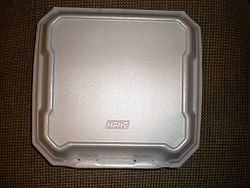History
Hefty was founded by Mobil in 1965. Plastics Division headquartered in Macedon, New York, was acquired by Tenneco Packaging in 1995 with a $1.27 billion purchase of Mobil's 4,100-employee plastics division, [2] then Pactiv Corporation (1999–2010). Hefty products have been owned or licensed by Reynolds Consumer Products, Inc, headquartered in Lake Forest, Illinois since Pactiv was acquired by Reynolds' parent company, Reynolds Group Holdings, on November 16, 2010. [3] [4]
OneZip
The Hefty OneZip sliding tab sealable bag, formerly known as the "rolling-action zipper profile and slipper", was created by Eric A. St. Phillips and F. John Harrington Jr. at Mobil in the early 1990s at a cost of $25 to $50 million, after having developed and evaluated various different zipper designs, and finally deciding to roll out the "boxcar-shaped version", which slides over dual plastic tracks. [5]
Environmental concerns
Hefty was one of the brands (along with Kordite and Baggies (another Pactiv brand)) named in a complaint brought against Mobil by the United States Federal Trade Commission in 1992, regarding claims made by the company in advertisements and packaging, which allegedly led consumers to believe that the bags were more biodegradable than other brands of bag, despite a lack of evidence to support this claim nor presentation of a specific definition for the term. The FTC dropped their complaint after Mobil agreed to cease making such claims. [6] [7]
This page is based on this
Wikipedia article Text is available under the
CC BY-SA 4.0 license; additional terms may apply.
Images, videos and audio are available under their respective licenses.

